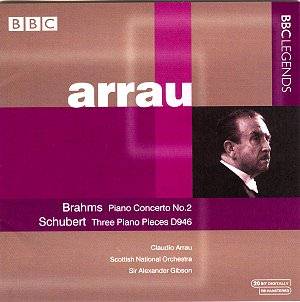Arrau left a vast legacy of studio recordings,
and when I saw that BBC Legends were putting out a version of
a concerto which he set down more than once with de-luxe orchestras
and starry names on the rostrum, my immediate reaction was that
they were just cashing in on his great name. Now I have heard
the disc I am happy to say this is not so, for it adds to our
knowledge of his art.
I have investigated Arrauís recordings more dutifully
than enthusiastically over the years, finding him rather avuncular
in his measured expounding of the texts, and the rich and rounded
timbres the Philips engineers blessed him with in his later decades
only contributed to the effect. Here, in a slightly clangy and
shallow mono recording (but one you can get used to quite quickly),
he is heard playing like a man possessed. Though the tempo in
the first movement of the Brahms is very broad, and treated with
a certain flexibility (an ebb and flow rather than actual gear-changes)
the effect is often that of a molten fury, contrasting with the
amplitude of the more relaxed moments. This continues not only
in the second movement but also in much of the third, which is
actually taken relatively fast. Others have found more grace and
playfulness in the finale but underplaying this movement can be
a danger if it is to make a proper conclusion to the majesty of
what has come before, and no one could accuse Arrau of doing that.
It seems then that Arrau, like so many others, even those apparently
unafraid of the recording process, was freer with a public in
front of him, so I hope the ubiquity of his commercial records
(itís unlikely that any radio station actually has tapes of him
playing anything he didnít record commercially in his long career)
will not discourage further investigation.
All this would have been useless without proper
collaboration from orchestra and conductor, and here too I had
a pleasant surprise. In the four years I spent in Edinburgh in
the early seventies I heard much from Gibson and admired a lot
of it, but Brahms never seemed to be his composer, a finely conceived
Second Symphony apart. He also often seemed overawed by the most
famous soloists and accompanied them with more respect than inspiration.
But he was an unpredictable artist and on his day he could come
up with things youíd never have believed of him. So it is here;
he conducts with a passion and poetry that he never managed in
any of the Brahms performances I witnessed. Furthermore, he seems
to have identified himself totally with Arrauís interpretation,
so that the ebb and flow of tempi is exactly matched between them.
In 1963 he was just four years into his long reign with the SNO
and had many years of hard work ahead before the orchestra was
to become a viable recording orchestra and could measure up to
international tours. Yet they seem galvanised by the occasion
and sound in pretty good shape.
Perhaps BBC Legends should be looking at their
Gibson material, for on his day he could be memorable. Still,
this is Arrauís disc, and who could complain about the robust
Schubert which completes the programme? Perhaps this Schubert
seen through Beethovenian eyes, but better that than underplay
this visionary works. If you donít know these late pieces, written
six months before Schubertís death, then donít imagine they are
a pleasant little make-weight. The three of them play for nearly
half-an-hour and if Schubert had been born a little later he would
have called them "Ballades" or something of the kind.
This 1959 recording actually sounds better than the Brahms.
Christopher Howell
